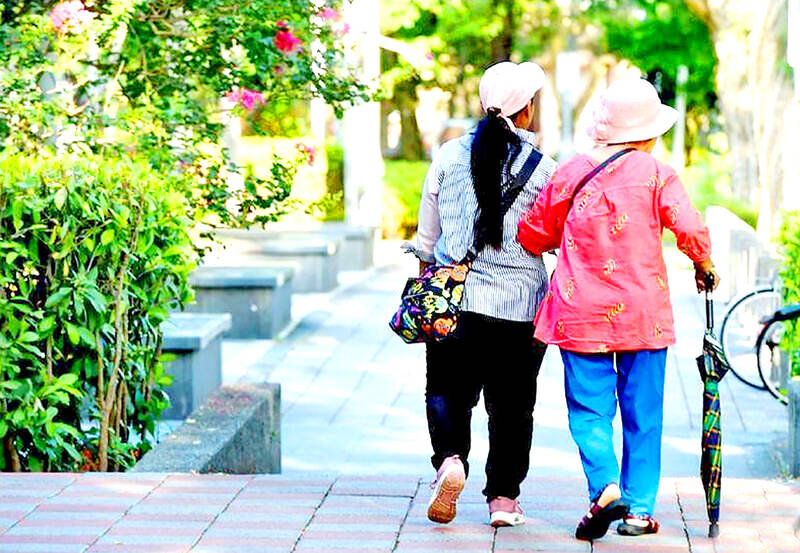Taiwan is facing growing poverty among elderly households as people aged 65 or older with a near-poor background have multiplied over the past decade, a report from the Legislative Yuan’s Budget Center said yesterday.
The report urged the government to address elderly poverty.
Citing the “Report on the Survey of Family Income and Expenditure” from the Directorate-General of Budget, Accounting and Statistics (DGBAS), it said the average annual disposable income per household in the top quintile was NT$2.3 million (US$71,801) last year, a 2.6 percent increase from the previous year, while the figure in the bottom quintile was NT$376,000, up by 3.0 percent, indicating an income difference of 6.12 times between the two groups.

Photo: Taipei Times
People aged 65 or older made up 25.96 percent of heads of household last year, up by 12.68 and 0.9 percentage points from 2001 and 2022 respectively, with those in the lowest quintile rising from 40.71 percent in 2001 to 63.62 percent last year, DGBAS data showed.
That suggested household heads aged 65 or older in the quintile of the lowest household income is increasing and has exceeded 60 percent of the quintile, the DGBAS data showed.
The report also showed the average household size was 2.79 people last year, with an average disposable income of NT$1.14 million and an average expenditure of NT$861,300.
For households whose head was aged 65 or older, the average household size was 1.92 people, with an average disposable income of NT$724,400 and an average expenditure of NT$621,800 — all lower than the average figures, it said.
The bottom quintile of households with a head aged 65 or older consisted of 1.16 million households, accounting for 49 percent of all households headed by a person 65 or older with an average disposable income of NT$356,200, which is less than their average expenditure of NT$393,400 at a difference of NT$37,800, it cited the report as saying.
About half of households with a head aged 65 or older had lower annual disposable income than their expenditure last year, and the income-expenditure difference is worryingly greater than that of the whole, it said.
Meanwhile, Ministry of Health and Welfare data showed that among all low to middle-income households, 23.45 percent had a head aged 45 to 64 and 23.38 percent had a head aged 65 or older last year, both a new high in the past 10 years.
Among all low-income households, those headed by a person 65 or older accounted for a record 17.67 percent in the past decade, it showed.
People aged 65 or older from a low to middle or low-income households have multiplied from 2014 and amounted to 64,740 people last year, the ministry said, calling for the government to pay attention to older people with economically disadvantaged backgrounds.

NATIONAL SECURITY THREAT: An official said that Guan Guan’s comments had gone beyond the threshold of free speech, as she advocated for the destruction of the ROC China-born media influencer Guan Guan’s (關關) residency permit has been revoked for repeatedly posting pro-China content that threatens national security, the National Immigration Agency said yesterday. Guan Guan has said many controversial things in her videos posted to Douyin (抖音), including “the red flag will soon be painted all over Taiwan” and “Taiwan is an inseparable part of China,” while expressing hope for expedited “reunification.” The agency received multiple reports alleging that Guan Guan had advocated for armed reunification last year. After investigating, the agency last month issued a notice requiring her to appear and account for her actions. Guan Guan appeared as required,

Japan and the Philippines yesterday signed a defense pact that would allow the tax-free provision of ammunition, fuel, food and other necessities when their forces stage joint training to boost deterrence against China’s growing aggression in the region and to bolster their preparation for natural disasters. Japan has faced increasing political, trade and security tensions with China, which was angered by Japanese Prime Minister Sanae Takaichi’s remark that a Chinese attack on Taiwan would be a survival-threatening situation for Japan, triggering a military response. Japan and the Philippines have also had separate territorial conflicts with Beijing in the East and South China

A strong cold air mass is expected to arrive tonight, bringing a change in weather and a drop in temperature, the Central Weather Administration (CWA) said. The coldest time would be early on Thursday morning, with temperatures in some areas dipping as low as 8°C, it said. Daytime highs yesterday were 22°C to 24°C in northern and eastern Taiwan, and about 25°C to 28°C in the central and southern regions, it said. However, nighttime lows would dip to about 15°C to 16°C in central and northern Taiwan as well as the northeast, and 17°C to 19°C elsewhere, it said. Tropical Storm Nokaen, currently

PAPERS, PLEASE: The gang exploited the high value of the passports, selling them at inflated prices to Chinese buyers, who would treat them as ‘invisibility cloaks’ The Yilan District Court has handed four members of a syndicate prison terms ranging from one year and two months to two years and two months for their involvement in a scheme to purchase Taiwanese passports and resell them abroad at a massive markup. A Chinese human smuggling syndicate purchased Taiwanese passports through local criminal networks, exploiting the passports’ visa-free travel privileges to turn a profit of more than 20 times the original price, the court said. Such criminal organizations enable people to impersonate Taiwanese when entering and exiting Taiwan and other countries, undermining social order and the credibility of the nation’s